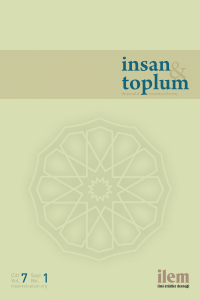Abstract
Modernleşme ile sekülerleşme arasında yakın bir ilişki olduğu genelde vurgulanmıştır. Türkiye modernleşmesi, kendi tarihsel ve sosyolojik gerçekliğinde din, toplum ve siyaset ilişkisinin sekülerleşme dolayısıyla yorumlanabileceği bir süreç olarak kabul edilebilir. Bu süreçte zamanla eskiye ve geleneksele ait olanlar ile yeni ve modern olanlar arasında kültürel ve siyasal bir mesafe oluşmuştur. II. Meşrutiyet sonrasında tartışılmaya başlanan, cumhuriyetin kurulmasının ardından da toplumsal hayata geçirilen pek çok yenilik, yeni iktidarın sekülerleşme siyasetinin bir sonucu olarak yorumlanmıştır. Öyle ki cumhuriyet modernleşmesi, laiklik ilkesi temelinde bir toplumsal bölünmenin yaşanmasına sebep olmuştur. Yıllardır toplumun geleneksel dini yapısının üretenleri olan dini gruplar ve cemaatler, bu bölünmede iktidar tarafından “öteki” olarak tanımlanmışlardır. Dini grupların kamusal alandaki meşruluklarını
kaybetmeleri, yok olmaları anlamına gelmemiş, genelde yer altına çekilerek kendi varlıklarını sürdürmelerine sebep olmuştur. Tek parti iktidarı boyunca devletle gerilimli bir ilişki halinde olan dini gruplar, çok partili hayata geçişle birlikte siyaset ile faydacı bir ilişki halinde olmuşlardır. Siyasi partiler de dini gruplar ile benzer bir fayda ilişkisini gözetmişlerdir. Askeri darbeler yoluyla siyasete müdahale edildiği dönemlerde, bürokratik yapıda tek parti dönemindekine benzer refleksler gösterilmişse de demokrasiye dönülmesiyle birlikte siyasiler ve dini gruplar açısından karşılıklı bir fayda diyalektiği üretilmeye devam edilmiştir. 28 Şubat süreci ve AK Parti iktidarı dönemi, Türkiye modernleşmesinde dini grupların konumu açısından farklı dönemler olarak da dikkat çekmiştir.
References
- Ahmad, F. (2014). Modern Türkiye’nin oluşumu (12. Baskı). (Y. Alogan Çev.) İstanbul: Kaynak Yayınları.
- Berkes, N. (2002). Türkiye’de çağdaşlaşma. (A. Kuyaş, Çev.) İstanbul: Yapı Kredi Yayınları.
- Çakır, R. (2004). Milli Görüş Hareketi. Y. Aktay (Der.), İslamcılık içinde (s. 544-575). İstanbul: İletişim Yayınları.
- Güngör, E. (2007). Dünden bugünden (11. Baskı). İstanbul: Ötüken Yayınları.
- Kahraman, H. B. (2010). Türk siyasetinin yapısal analizi II. İstanbul: Agora Kitaplığı.
- Kara, İ. (2006). Cumhuriyet döneminde tarikatlar. Demokrasi Platformu, 6, 1-20.
- Kara, İ. (2014). Cumhuriyet Türkiye’sinde bir mesele olarak İslam I (6. Baskı). İstanbul: Dergah Yayınları.
- Karpat, K. (2009). Osmanlı’dan günümüze kimlik ve ideoloji. (G. Ayas, Çev.) İstanbul: Timaş Yayınları.
- Kayalı, K. (2012). Ordu ve siyaset: 27 Mayıs-12 Mart (5. Baskı). İstanbul: İletişim Yayınları.
- Koçkuzu, A.O. (2011). Çanakkale cephesinde bir müderris: Abdullah Fevzi Efendi (2. Baskı). İstanbul: İz Yayınları.
- Mahçupyan, E. (1998). Türkiye’de merkeziyetçi zihniyet, devlet ve din. İstanbul: Patika Yayınları.
- Mardin, Ş. (2011a). Türkiye, İslam ve Sekülarizm. İstanbul: İletişim Yayınları.
- Mardin, Ş. (2011b). Türkiye’de din ve siyaset (16. Baskı). İstanbul: İletişim Yayınları.
- Özcan, Z. (2015). İnönü dönemi dini hayat. İstanbul: Değerler Eğitimi Merkezi Yayınları.
- Tunçay, M. (2005). Türkiye Cumhuriyeti’nde tek parti yönetiminin kurulması (4. Baskı). İstanbul: Tarih Vakfı Yurt Yayınları.
Abstract
It is generally emphasized that there is a close relationship between modernization and secularization. Turkey’s modernization process can be regarded as a secularization process of religion, society and politics in relation to Turkey’s sociological and historical reality. In the process, a cultural and political distance has developed between the old and the traditional and the new and modern. Many innovations that began to be discussed after the II. Constitutional period and passed on to the social life after the establishment of the republic were interpreted as a result of the policy of secularization of the new government. The modernization of the republic has caused a social division on the basis of secularism. Religious groups and communities, which have been the producers of the traditional religious structure of the society for many years, are defined by the ones in power as “the other” in this division. The loss of legitimacy of those religious groups in the public sphere did not mean that they were destroyed, but it often caused them to go underground in order to continue their existence. Religious groups were in a tense relationship with the state during the single-party rule, after transition to multi-party system, they have had a pragmatic relationship with politics. Political parties also observed a similar benefit relationship with religious groups. Although bureaucratic structures showed similar reflexes to that in the single party period during the period when politics was interfered by military coups, mutual benefit dialect continued to be produced in terms of politics and religious groups with the return of democracy. The period of February 28 and AK Party ruling also attracted attention as different periods in terms of the position of religious groups in the modernization of Turkey
References
- Ahmad, F. (2014). Modern Türkiye’nin oluşumu (12. Baskı). (Y. Alogan Çev.) İstanbul: Kaynak Yayınları.
- Berkes, N. (2002). Türkiye’de çağdaşlaşma. (A. Kuyaş, Çev.) İstanbul: Yapı Kredi Yayınları.
- Çakır, R. (2004). Milli Görüş Hareketi. Y. Aktay (Der.), İslamcılık içinde (s. 544-575). İstanbul: İletişim Yayınları.
- Güngör, E. (2007). Dünden bugünden (11. Baskı). İstanbul: Ötüken Yayınları.
- Kahraman, H. B. (2010). Türk siyasetinin yapısal analizi II. İstanbul: Agora Kitaplığı.
- Kara, İ. (2006). Cumhuriyet döneminde tarikatlar. Demokrasi Platformu, 6, 1-20.
- Kara, İ. (2014). Cumhuriyet Türkiye’sinde bir mesele olarak İslam I (6. Baskı). İstanbul: Dergah Yayınları.
- Karpat, K. (2009). Osmanlı’dan günümüze kimlik ve ideoloji. (G. Ayas, Çev.) İstanbul: Timaş Yayınları.
- Kayalı, K. (2012). Ordu ve siyaset: 27 Mayıs-12 Mart (5. Baskı). İstanbul: İletişim Yayınları.
- Koçkuzu, A.O. (2011). Çanakkale cephesinde bir müderris: Abdullah Fevzi Efendi (2. Baskı). İstanbul: İz Yayınları.
- Mahçupyan, E. (1998). Türkiye’de merkeziyetçi zihniyet, devlet ve din. İstanbul: Patika Yayınları.
- Mardin, Ş. (2011a). Türkiye, İslam ve Sekülarizm. İstanbul: İletişim Yayınları.
- Mardin, Ş. (2011b). Türkiye’de din ve siyaset (16. Baskı). İstanbul: İletişim Yayınları.
- Özcan, Z. (2015). İnönü dönemi dini hayat. İstanbul: Değerler Eğitimi Merkezi Yayınları.
- Tunçay, M. (2005). Türkiye Cumhuriyeti’nde tek parti yönetiminin kurulması (4. Baskı). İstanbul: Tarih Vakfı Yurt Yayınları.
Details
| Primary Language | Turkish |
|---|---|
| Subjects | Sociology |
| Journal Section | Research Articles |
| Authors | |
| Publication Date | July 30, 2017 |
| Published in Issue | Year 2017 Volume: 7 Issue: 1 |


